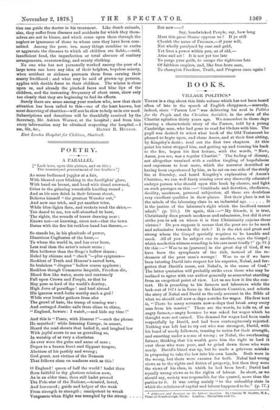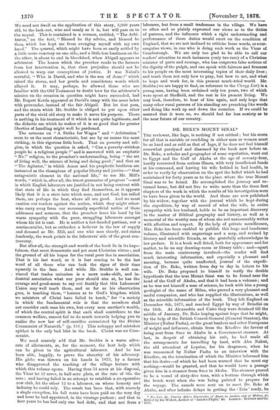BOOKS.
VILLAGE POLITICS.* THERE is a ring about this little volume which has not been heard often of late in the speech of English clergymen,--scarcely, indeed, since "Parson Lot" was delivering his soul in Politics for the People and the Christian Socialist, in the crisis of the Chartist agitation thirty years ago. We remember in those days hearing a characteristic story of the Parson, told by a young Cambridge man, who had gone to read for Orders with him. The pupil was desired to select what book of the Old Testament he pleased to begin upon, and chose Amos, and at their first sitting, by Kingsley's desire, read out the first two chapters. At this point his tutor stopped him, and getting up and turning his back to the fire, began his first lecture, with the words, "Now, Amos, you see, was a regular Chartist." The feeling of dismay, not altogether unmixed with a sudden tingling of hopefulness and eagerness to hear more, which the narrator described as having been experienced by him, as he sat on one side of the study fire at Everaley, and heard Kingsley's explanation of Amos's Chartism, we can well fancy coming over any discreetly educated embryo parson who should open this book by chance, and light on such passages as this :—" Gratitude and devotion, obedience, docility, meekness, personal subjection, all these are doubtless very excellent qualities in their places. But their place is not in
the minds of the labouring class in an industrial age It is the justice of the labourer's right which the landlord cannot admit." (p. 155.) Or again, this :—" My friends, it is true, Christianity does preach meekness and submission, but did it ever strike you to ask on whom it is that Christianity enjoins these virtues? Do you suppose it means that the poor are to be meek and submissive towards the rich ? It is the rich and great and strong whom the Gospel specially requires to be bumble and meek. All of you be subject one to another, says the Gospel ; which needs this witness sounding in his ears most loudly ?" (p. 91.) Or this :—" Woe to us [parsons] in the great day of God, if we have been the sycophants of the rich, instead of the re- dressors of the poor man's wrongs ! Woe to us if we have been tutoring David into respect for his superior, Nabal, and for- gotten that David's cause, not Nabal's, is the cause of God." The latter quotation will probably strike even those who may be inclined to agree with our author generally as somewhat startling from an exegetical point of view. Let us see how it fits the con- text. He is preaching to his farmers and labourers while the lock-out of 1874 is in force in the Eastern Counties, and selects the story of Nabal and David as the only account in the Bible of what we should call now-a-days a strike for wages. His first text "There be many servants now-a-days that break away every man from his master." These are the words, be tells us, of an angry farmer,—angry because he was asked for wages which he thought were not earned. The demand for wages had been made respectfully by David, and bad been contemptuously rejected. Nothing was left but to try out who was strongest, David, with his band of needy followers, trusting to union for their strength, and smarting under a sense of wrong ; or Nabal, the overbearing farmer, thinking that his wealth gave him the right to lord it over those who were poor, and to grind down those who were needy. David's blood was up, but be made a grievous mistake in proposing to take the law into his own hands. Both were in the wrong, but there were excuses for both. Nebel had wrong views as to the rights and duties of property, but then they were the views of his class, in which he had been bred ; David had equally wrong views as to the rights of labour. In abort, as we should say, society was responsible for the quarrel, more than the parties to it. It was owing mainly "to the unhealthy state in which the relations of capital and labour happened to be." (p. 77.) • Addresses and Sermons on Me Labour gelation. By Charles W. Stubbs, M.A., Vicar of Oranborough, Bucks. London : Macmillan and Co.
We need not dwell on the application of this story, 3,000 years old, to the lock-out, wise and manly as it is, but will pass on to the sequel. This is contained in a sermon, entitled, "The Arbi- trator," on the text, "Blessed be thy advice, and blessed be thou, which has kept me from avenging myself with my own hand." The quarrel, which might have been so easily settled by a little more courtesy on one side, and a little less hastiness on the the other, is about to end in bloodshed, when Abigail appears as arbitrator. The lesson which the preacher reads to the farmers from her intervention is, that class prejudice should not be allowed to warp our conceptions of justice. It was Nabal's scornful, "Who is David, and who is the son of Jesse ?" which raised the storm, and her gentle and considerate words which
allayed it. It may, perhaps, be allowed those who are familiar with the Old Testament to doubt how far the arbitrator's mission on the occasion in question might have succeeded, had Mr. Rupert Kettle appeared at David's camp with the asses laden with provender, instead of the fair Abigail. But let that pass, and the strain which Mr. Stubbs is obliged to put upon other parts of the vivid old story to make it serve his purpose. There is nothing in his treatment of it which is not quite legitimate, and the didactic use which he makes of it is so good that far greater liberties of handling might well be pardoned.
The sermons on "A Strike for Wages" and " Arbitration " seem to us the most characteristic, but are by no means the most striking, in this vigorous little book. That on poverty and reli- gion, in which the question is asked, "Can a poverty-stricken people be a religious people ?" and is answered with an emphatic "No !" religion, to the preacher's understanding, being "the art of living well, the science of being and doing good ;" and that on "The Agitator," in which Amos and his prophetic brethren are instanced as the champions of popular liberty and justice—" that antagonistic element in the national life," to use Mr. Mill's words, "which is, after all, the truest guarantee of progress "—and in which English labourers are justified in not being content with that state of life in which they find themselves, as it appears likely that it is a state into which man, and not God, has called them, are perhaps the best, where all are good. And we must caution our readers against the notion, which they might other- wise carry away from our necessarily superficial notice of these addresses and sermons, that the preacher loses his head by his warm sympathy with the poor, struggling labourers amongst whom his lot is cast. He is neither a hot-headed partisan, nor a sentimentalist, but as orthodox a believer in the law of supply and demand as Mr. Mill, and one who sees clearly, and states fearlessly, the weak points in the labourers' side of the great con- troversy.
Bat after all, the strength and worth of the book lie in its hope- fulness, that most democratic and yet most Christian virtue ; and the ground of all his hopes for the rural poor lies in association. That is his last word, as it is fast coming to be the last word of all those who can look the signs of their time squarely in the face. And while Mr. Stubbs is well con- vinced that trades unionism is a mere make-shift, and in- dustrial association what our poor should aim at, he has the courage and good-sense to say out frankly that this Labourers' Union may well teach them, and so far as his observation goes, is teaching them, "lessons as to God's kingdom which we ministers of Christ have failed to teach," for "a society in which" the fundamental rule is that the members shall not consider each man his own, but every man another's wealth, of which the central spirit is that each shall contribute to the common welfare, cannot fail to do much towards helping you to realise the new law of self-sacrifice enunciated by the Divine Communist of Nazareth." (p. 116.) This unhappy and mistaken epithet is the only bad blot in the book. Christ was no Com-
munist. - We need scarcely add that Mr. Stubbs is a warm advo- cate of allotments, as, for the moment, the best help which can be given to the agricultural labourer. And he has been able, happily, to prove the sincerity of his advocacy. His glebe was thrown on his hands in 1873, by a farmer who disapproved the teaching of the village lecture with which this volume opens. Having thus 34 acres at his disposal, the Vicar let 22 acres, in half-acre plots, at the rate of 66s. the acre ; and having failed in an attempt to establish a co-operative cow club, let the other 12 to a labourer, on whose honesty and 'industry he could rely. The result has been that, with scarcely a single exception, his full rents have been paid on the very day and hour he had appointed, in the vicarage parlour ; and that in four years he has had only one bad debt, and that not from a
labourer, but from a small tradesman in the village. We have so often and so plainly expressed our views as to the duties of parsons, and the influence which a right understanding and performance of those duties would exert on the condition of England, that we are not inclined to criticise loose words, or over- sanguine views, in one who is doing such work as the Vicar of Granborough. We are only too glad to be able to call our readers' attention to such instances (only too rare) of a Christian minister of parts and courage, who has outgrown false notions of the dignity of the pulpit, and can speak with fairness and firmness to his people on the most interesting topics of their daily lives ; and teach them not only how to pray, but how to act, and what to hope and work for, in this present much-tried world. Mr. Stubbs (we are happy to find, on reference to the Clergy List) is a young man, having been ordained only ten years, two of which were spent at Sheffield, and the rest in his present living. We may look, therefore, to hear of him again, and only hope that many other rural parsons of his standing are preaching like words and doing like work up and down the counties. If we could be assured that it were so, we should feel far less anxiety as to the near future of our country.



































 Previous page
Previous page